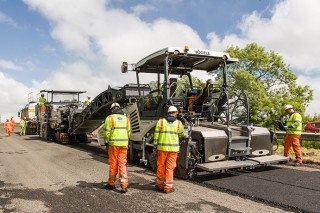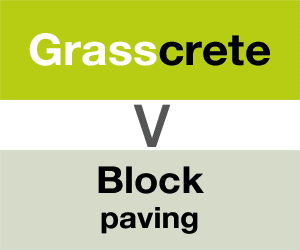A-one+, a joint venture of Colas, Costain and CH2M (Halcrow) that is Highways England’s contractor for the region, has used cold repaving to resurface 2.2km of the A1 at Brownieside in Northumberland.
The Wirtgen cold recycling machine is being used for the first time in the UK. It allows the underlying layers of the road to be recycled, churning up the old surface material, combining it with new material within the body of the machine then laying it back down immediately on the road behind.
More than five million square metres of thin layers are paved in cold application in Germany every year but this is the first time that the technique has been used in the UK.
The machinery here is owned and operated by subcontractor Lane Rental Services, which bought it three months ago. Wirtgen offers two models of cold recycling machines, the 2200 CR and the 3800 CR. Both have an integrated paving screed for in-situ cold recycling of carriageway pavement, but can be adapted for the addition of bitumen emulsion, foamed bitumen or water-cement slurry.
However, Lane Rental Services specified a custom-made 3200 CR, capable of paving carriageways of 3.2- to 5-metre widths.
In Northumberland it is being used in conjunction with a Vögele Super 1900-3i tracked paver.
Cold milling machines with fine milling drums first prepare the road surface for application of the thin overlay. The resultant fine profile of the milled roadway creates a substrate with which the micro-surfacing can engage. The ‘valleys’ of the fine-milled profile engage the layers of the micro-surfacing, thus producing a smooth layer structure.
Thin layers paved cold on cold provide a cost-effective as well as quick solution, allowing the road to reopen to traffic sooner than with hot asphalt techniques.
.png)
Highways England says that cold paving allows up to 1,000 tonnes per hour to be resurfaced compared to an average of 100 tonnes per hour using conventional methods.
There is also a 75% reduction in the amount of quarried stone used on the job, a 66% reduction in the amount of waste taken to landfill and there are 70% fewer lorry trips to and from site. Usually, resurfacing a road means planing off the old road surface and taking it away on trucks as waste. The new material, often mixed off site, is brought in hot and laid using a resurfacing machine. This is usually in truckloads of 20 tonnes with an average of 350 tonnes per shift being brought in altogether.
According to Lane Rental Services managing director Mike Reay, cold paving in this way is – depending on the size and type of scheme – between 33% and 50% cheaper than repaving with hot rolled asphalt. On the A1 scheme, there was a 40% cost reduction.
Highways England project manager Steve Bishop said: “There are lots of benefits to using this new way of working. It means we can resurface larger areas of road, there are fewer construction vehicle trips and the road surface is designed to last for at least 10 years, meaning that we shouldn’t need to go back to carry out further repairs any time soon meaning less disruption for drivers.
“This is the first machine of its type in the UK but the process is already successfully used in the USA, France and China. We are always working with our partners to trial new technologies that will help us to minimise disruption to drivers while we carry out essential road maintenance.”
Work started at Brownieside on Tuesday 2nd August after a trial 4.5km run on another section of the A1 nearby, when 11,000 tonnes of road recycling was completed in 10 days. Both lanes on the southbound carriageway are being resurfaced. The project is expected to take three weeks and work will be carried out during the day, with a contraflow arrangement on the northbound carriageway.
Got a story? Email news@theconstructionindex.co.uk



